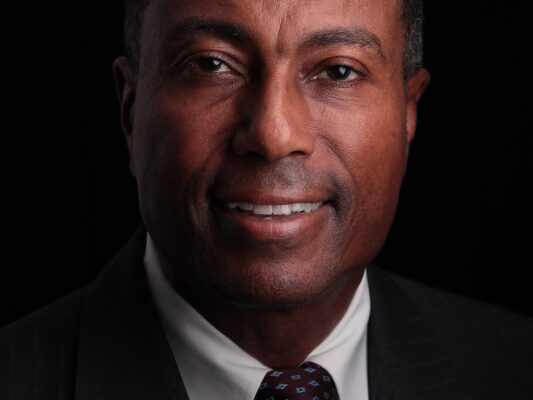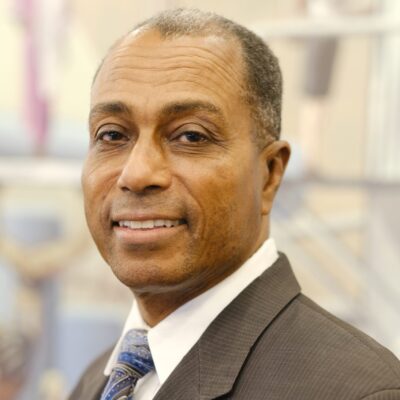This op-ed was originally published by The Detroit Free Press
Fifty-four years to the day after an assassin’s bullet took the life of Martin Luther King, Jr., a Grand Rapids police officer placed a gun against the head of 26-year-old Patrick Lyoya, pulled the trigger and snatched the father of two small children away from his family forever.
It was a far cry from Dr. King’s most cherished hopes and dreams. Mr. Lyoya did not have to die.
Lyoya, a Congolese immigrant, was pulled over by the officer, purportedly because his license plate was not registered to the vehicle he was driving. Lyoya exited his vehicle and, after a verbal exchange with the officer, began to walk away.
It should have ended there. The officer could have questioned Lyoya’s passenger about his identity, address and any other information needed to make an arrest later, under calm and controlled circumstances. The officer could have impounded the vehicle and engaged with Lyoya when he sought to reclaim it at a police facility.
Instead, the officer followed Lyoya and initiated a protracted grappling contest during which a taser was deployed and blows were struck by the officer. It all ended with the fatal gunshot to the head.
Revising the rules of engagement
Law enforcement culture is grounded in strategies that demand full assertion of authority and control over “civilians” by any means and at all costs. Nevertheless, when it comes to pursuit of suspects who flee, a growing number of police departments are concluding that such challenges to authority need not prompt officers to try to “win” the contest.
Baltimore, Cincinnati, Chicago and other cities have policies that require officers to balance the need for pursuit against the risk of harm to officers, the suspect, and the public. Officers are further required to determine whether there are alternatives to a foot chase for purposes of apprehending a suspect, particularly in cases where the suspect’s identity is known.
In fact, Baltimore’s foot pursuit policy flatly prohibits chases in cases where is a curfew violation, a citation-only violation, or a non-arrestable offense.
Concerns don’t end with the act of pursuit. Progressive police policies also address the issue of what happens after a suspect is apprehended. When it comes to foot chases, officers who believe they have risked life and limb to chase a disobedient, uncooperative suspect will almost certainly be enraged, and the urge to impose summary punitive justice on a captured suspect might be overwhelming for some officers, particularly if they are – like too many police officers – indifferent to the value of Black life.
The fact that methods of de-escalating conflicts are receiving ever-increasing attention in the law enforcement community reflects an awareness that violence often occurs when encounters are tense, and emotions are raw. If arrests and other law enforcement measures that place members of the public at risk are postponed until emotions and tempers have cooled, the chances are greater that the encounter will end peacefully.
For these reasons, it makes sense for officers to refrain from chases altogether when a suspect poses no danger to himself or anyone else.
Building a better police force
Police officers are trained to be soldiers. They learn to shoot, grapple and intimidate. Within their highly-charged environment, too often an “us against them” mentality takes hold, and certain communities – particularly communities of color – become enemy territories to be occupied and dominated simply because of unfounded stereotypes about Black criminality. It is a certain prescription for violence.
Breaking down a police culture that promotes confrontation, conflict, combat and “the chase” will require different types of officers. Most emergencies do not require soldiers. More often, they require mental health professionals, drug treatment specialists, social workers, mediators, paramedics, auto mechanics, and professionals from various other disciplines.
While it is difficult to suggest anything positive that can come from Patrick Lyoya’s killing, his death must not be in vain. We must put an end to the brutal indifference to Black lives.
A good start would be if Grand Rapids city officials and municipal officials throughout Michigan seriously consider significantly reducing the number of soldier-type police officers in their employ and hiring more professionals with skills needed to respond to the nonviolent, non-criminal emergencies their departments more frequently confront.
Replacing significant numbers of soldier cops with emergency response professionals may be exactly what’s needed to eliminate a race-driven, aggressive police culture, and to make real at least part of Dr. Martin Luther King, Jr’s grand dream.
Mark P. Fancher is the staff attorney for the Racial Justice Project of the ACLU of Michigan.


